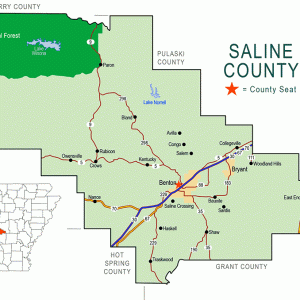calsfoundation@cals.org
Rubicon (Saline County)
A historic rural community in Dyer Township in Saline County during the late 1800s and early 1900s, Rubicon was located in the vicinity of the Alum Fork of the Saline River. Modern maps have it situated along Arkansas State Highway 9 approximately two miles north of the intersection of Arkansas State Highways 9 and 5 at Crows (Saline County), approximately thirteen miles west of Benton (Saline County) and twenty-one miles east of Hot Springs (Garland County).
Early settlers to the area were hardy pioneers who farmed and hunted the rich lands along the Saline River and eastern Ouachita Mountains. One of the earliest families to arrive in the area were the Dyers, for whom the township was named. Charles Dyer and sons Given, Hassary, John, and Campbell Charles came to Saline County from Kentucky in 1835. All purchased lands along the Middle and Alum Forks of the Saline River and began farming. The elder Dyer served during the 1836 Indian Wars in Company B, First Arkansas Mounted Gunmen, Arkansas Militia, a Saline County company in that regiment. It saw service along Arkansas’s western border with Indian Territory and at Forts Towson and Gibson. During the Civil War, many of the sons of these men served primarily in Confederate forces, with a few serving in Union units.
Early economic efforts centered on farming, hunting, and trapping. By 1860, Dyer Township boasted three doctors, two school teachers, two blacksmith shops, two grist mills, a stone turner, and a wagon maker. After the destruction of the Civil War, the area returned to its agricultural pursuits but soon began taking advantage of the vast amounts of timber available.
For most of its early years, the community received its mail from the Bland (Saline County), Benton, or Owensville (Saline County) post offices. As the population increased, the need for a local post office resulted in the establishment of the Rubicon Post Office in 1891, with Charles Ewell as postmaster. It is unknown why that particular name was selected, but it is the name of the river located in central Italy that flows into the Adriatic Sea. According to Ewell’s son, Frank, his father may have chosen the name from his interest in history. The Rubicon River was crossed by Caesar’s army in 49 BC, igniting civil war in the region. Postmaster Ewell also referred to Rubicon in his writings for the Benton Courier as “Bitter Kreek,” most likely in reference to the Alum Fork of the Saline River. However, another post office was opened in the vicinity from 1925 to 1929 named Bitter Creek. It is unknown if this was a renaming of the Rubicon office or was a separate location. Mail arrived three times a week, but due to improvement in roads and transportation, it closed in 1929, with mail service out of Benton.
In 1900, the population of the community stood at fifty, with Nick Crawford serving as mayor, even though not of an incorporated town. The community boasted two general stores, a blacksmith shop, and a railway/express agent who provided transportation of goods to and from the nearest railway depot at Lonsdale (Garland County), twelve miles away. Rubicon Lodge Number 627 was chartered on November 18, 1908, with ten members and remains an active Masonic lodge in the twenty-first century.
The most widely known aspect of Rubicon was its community leader Charles David Ewell. Ewell wrote a regular column for the Benton Courier newspaper under the name Dick Boyd for fifty years. The column consisted of “folksy” events from that neighborhood, consisting of Rubicon, Bitter Kreek, and Gravel Hill (Saline County). Ewell was a delegate for Saline County to the state Farmers’ Union convention in 1907 or 1908, serving as chairman of the resolutions committee, where he presented and discussed more than 100 resolutions. He later served three terms in the Arkansas General Assembly as a member of the House of Representatives for Saline County. Fathering twenty-two children in his lifetime, Ewell died on Aril 18, 1947, with Masonic burial conducted by Rubicon lodge at Guerin Cemetery.
In the twenty-first century, the community formerly known as Rubicon is represented by the small rural communities of Gravel Hill and Crows. The major industry in the area is timber, with a general store as the only business. Many residents continue farming pursuits or obtain employment in nearby Benton, Little Rock (Pulaski County), and Hot Springs.
For additional information:
“Rubicon, Arkansas.” The Saline 3 (December 1988): 181–182.
Torvestad, Ginny. “Where in the World is Rubicon, Arkansas.” Benton Courier, August 5, 1980, p. 2.
Anthony Rushing
Benton, Arkansas
 Saline County Map
Saline County Map 



I wasn’t aware of the “town” of Rubicon until I had a Rubicon sandwich at the Old Crows restaurant (Highway 5 & 9), which is owned by a couple of U.S. veterans. It’s a great place to eat, and the people there are very friendly. Stop by sometime, you’ll be glad you did.